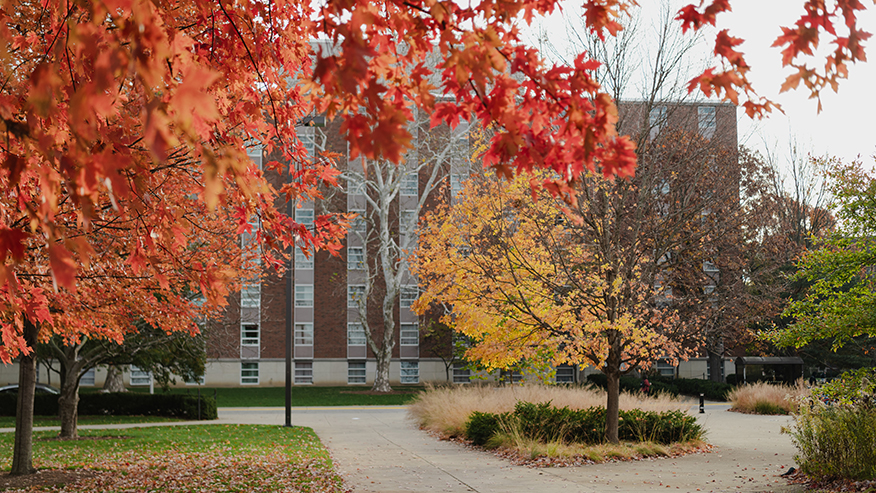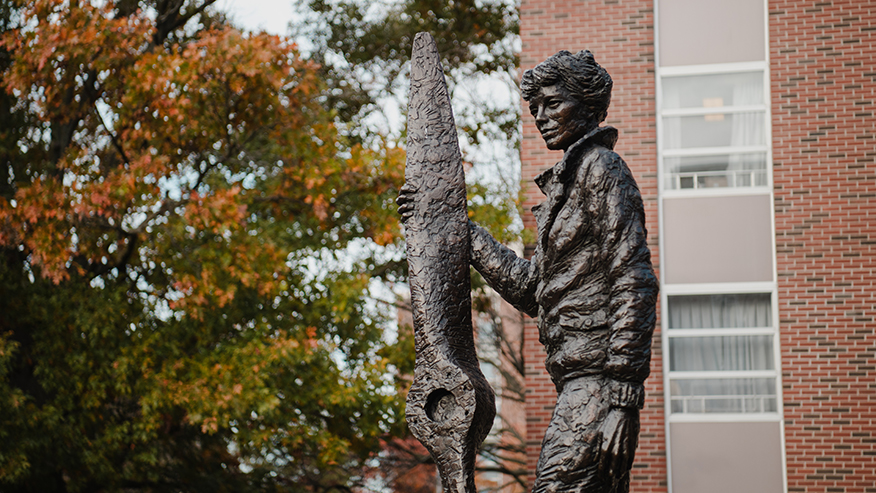National security leaders to discuss U.S. innovation in energetic materials during conference at Purdue University

Leaders in defense research will assemble at Purdue University for the 2022 Breakthrough Energetics conference to discuss improved domestic supply chains for innovative propellants, pyrotechnics and explosives. (Photo provided/Susan Fleck Photography)
WEST LAFAYETTE, Ind. —
Leaders in defense research will assemble at Purdue University for the 2022 Breakthrough Energetics Conference as the invasion of Ukraine and the shadow of a wider conflict underscore the need for improved domestic supply chains for innovative energetic materials. Purdue University and its Purdue Energetics Research Center (PERC), a national leader in research and in educating domestic professionals in energetic materials — propellants, pyrotechnics and explosives – will host the conference Wednesday and Thursday (May 4-5). The conference is organized by the National Defense Industrial Association (NDIA), in partnership with the NDIA Emerging Technologies Institute (ETI), the Energetics Technology Center (ETC) and Purdue.
U.S. national security depends on energetic materials developed decades ago, some of which are produced using offshore sources that are increasingly unreliable, as detailed in a recent article written by ETI and ETC leaders. As with several emerging technologies central to defense, the article notes, peer competitors have the potential to move ahead of the United States. But unlike some technologies central to defense, such as microelectronics, for which there is a vibrant commercial market, the federal government is the largest single driver in the market for energetic materials.
“At this pivotal moment, it’s critical we invest in developing technologies to ensure our country continues to lead the world, our military remains second-to-none, and we cultivate a high-skilled domestic workforce that meets the needs of our warfighters and broader economy,” said Sen. Todd Young, R-Indiana.
An aging industrial base and fragile supply chains jeopardize the United States’ ability to maintain superiority in a conflict. Congressional action, including the American Competes Act of 2022 and the House Armed Services Committee Future of Defense Task Force Report 2020, recognizes and seeks to reverse this growing concern. At Purdue, PERC works with nearly every agency within the U.S. national security sector on comprehensive energetic materials research “from molecules to munitions.”
“As a nation, we’ve backed ourselves a little bit into a corner by losing domestic workforce capacity. Purdue and our partners in the research laboratories of the Department of Defense, such as the Army Research Laboratory, as well as laboratories in the Department of Energy, the Department of Homeland Security and industry, are focused on growing talent in this space,” said Jeff Rhoads, professor of mechanical engineering and lead of the Air Force Research Laboratory Regional Research Hub-Midwest at Purdue.
Breakthrough Energetics 2022 is built around the recommendations of a congressionally mandated study conducted by the ETC, and co-authored by Theresa Mayer, Purdue executive vice president for research and partnerships; Marcus Jones, professor at the U.S. Naval Academy; and Robert Kavetsky, CEO of the Energetics Technology Center. Those recommendations roughly correspond to three conference themes needed to rebuild American capabilities in energetic materials.
“Priming the pipeline” refers to the need for innovative ideas and a skilled domestic workforce to produce energetic materials. “Science and technology challenges” speaks to overhauling the hierarchy of research decision-making to prioritize innovation. And “Reimagining technical requirements” acknowledges a need to alter the incentive structure in military contracts to emphasize revolutionary innovation over incremental improvements.
“We now know the obstacles to improving the pipeline of energetic materials, but to overcome those obstacles, we need the government, industry and higher education to work in concert,” said Mayer, who is also a member of NDIA’s board of directors. “The Breakthrough Energetics Conference is one piece of that coordinated effort, and I expect that the benefits of these discussions will resonate through the next steps; taking us from the incremental progress that we have to the revolutionary progress that we need.”
The conference has drawn leading voices in defense, including Harry Harris, former commander, U.S. Pacific Command and a former U.S. ambassador to the Republic of Korea, who will deliver the keynote address on the importance of advancing energetics. Three leaders within the Office of the Under Secretary of Defense for Acquisition & Sustainment will offer direct commentary from the Department of Defense. Christopher C. O’Donnell, the acting principal deputy assistant secretary of defense for acquisition , who advises the assistant secretary of defense for acquisition on matters relating to the Department of Defense Acquisition System; Steven G. Wax, principal deputy director of defense research and engineering for research and technology, who champions the Department of Defense Science and Technology Enterprise, will speak to the path forward; and Christine Michienzi, chief technology officer for the deputy assistant secretary of defense for industrial policy and for the undersecretary of defense for acquisition and sustainment, will discuss acquisition requirements.
As a lead institution for advancing U.S. energetics R&D, Purdue is a natural gathering place for the event. Purdue invests in energetic materials research and workforce development through its Next Moves initiatives, a set of strategic focus areas that are advancing the university’s position among the world’s top research and teaching institutions. PERC educates as many as 150 undergraduate and graduate students in energetic materials at any given time, the largest single source of domestic talent in the field.
Steven Beaudoin, PERC director, said Purdue is uniquely positioned to drive the field because the university has a deep talent pool in synthesis, process engineering and characterization, three areas needed to invent new energetic materials, develop advanced manufacturing processes and ensure the quality of resultant products.
The university also benefits from statewide support, with nearly 30% of U.S. munitions stored in southern Indiana, and a strong partnership with the Crane Army Ammunition Activity and Naval Surface Warfare Center Crane Division, in Crane, Indiana.
About Purdue University
Purdue University is a top public research institution developing practical solutions to today’s toughest challenges. Ranked in each of the last four years as one of the 10 Most Innovative universities in the United States by U.S. News & World Report, Purdue delivers world-changing research and out-of-this-world discovery. Committed to hands-on and online, real-world learning, Purdue offers a transformative education to all. Committed to affordability and accessibility, Purdue has frozen tuition and most fees at 2012-13 levels, enabling more students than ever to graduate debt-free. See how Purdue never stops in the persistent pursuit of the next giant leap at https://stories.purdue.edu
Writer: Mary Martialay
Note to journalists:
Visitors to campus should follow standards set in Protect Purdue guidelines.



